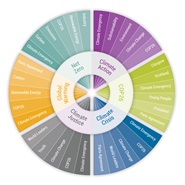A Closer Look at Product Governance ESG Risk Management
In 68% of our engagements, product governance is a significant material ESG issue, but it is our experience that most companies underestimate the materiality of this risk to investors. For some industries, product governance represents on average more than 20% of ESG risk exposure, as identified within our ESG Risk Rating framework.
Sustainable Finance and Banks: Reduced Risk, Increased Opportunity
Banks will play a key role in the green transition and those that commit to sustainable banking may gain an advantage over competitors, among other benefits. Indeed, banks are uniquely positioned to participate in and benefit from the transition to a green economy.
COP 26: A Spotlight on Emerging Climate Action Themes for Investors
Reactions to the COP26 Conference and the resulting Glasgow Climate Pact have predictably run the gamut from claims of greenwashing to the celebration of progress in the fight against climate change. Ultimately, any judgement on COP26 may be premature, as the success of the conference will best be measured in time by the extent to which commitments made are put into motion. While we wait to see the concrete actions that materialize, the past two weeks have underscored the importance of several themes that will garner increasing attention and should be considered by sustainable investors.
Infographic | 5 Breakout Innovations in Sustainable Finance for Banks
This infographic describes five key innovations in sustainable finance, including green deposits, sustainable deposits, green trade loans, green guarantees and letters of credit, sustainable supply chain financing, and offerings for borrowers in industries not traditionally considered green.
SFDR and EU Taxonomy Product Disclosure Rules Finally Released
The publication of these rules marks the end of a prolonged period of uncertainty in the market around final rules and timelines - assuming the RTS will be adopted as-is in a Delegated Act, which turns these rules into regulation. There are several noteworthy aspects to these rules, which we address from our perspective in this article.
Bringing Investors and Companies Together to Accelerate Human Rights Progress
Human rights issues have been rising on the responsible investment agenda in recent years. The COVID-19 pandemic and the Black Lives Matter movement have provoked even more pointed discourse on the topic. The European Union’s current efforts to introduce rules to hold companies accountable for social and environmental risks in their supply chains further accelerate that ascent. This wave of legal requirements and normative expectations is impacting financial markets worldwide, with responsible business regulations already in place or quickly becoming valid.
Know Where You Stand With Corporate ESG Benchmarking
In this post we discuss why companies should generate a corporate ESG benchmark against their peers, explain how they can go about this exercise, and highlight how they can use that information to advance and enhance their own corporate ESG initiatives.
Impact of Climate Change and Extreme Weather on Essential Services
Utilities have found themselves in the literal and metaphorical eye of the storm over the last year as hurricanes, floods and wildfires of increasing frequency and strength have wreaked damage on their assets. In late August, Storm Ida made landfall in Louisiana, USA and devastated the power grid lines. Entergy, the utility operating in Louisiana, supplying most of New Orleans, restored 90% of the supply only by mid-September, with 87,000 customers still without power.
The circular way forward could be the key to reducing food waste
Indications that a food crisis is imminent are clear. Fundamental changes in the global food system are required to address these challenges. This decade is a watershed moment for urgent efforts to close the loop, and companies and investors can play a pivotal role. Despite being closely connected to issues such as climate change and basic human rights, food waste has attracted comparatively less attention from companies, investors, and other stakeholders.
ESG Risks of Aging Pipelines for U.S. Energy Infrastructure Investors
Pipelines play a critical role in the U.S energy infrastructure transporting natural gas, crude oil, natural gas liquids, petroleum, and petrochemical products. While these pipelines play a vital role in supporting the U.S economy, investors are increasingly scrutinizing pipeline operators' long-term economic profitability and sustainability practices. A closer look into the status of pipelines reveals a particular issue that investors need to consider.
ESG Risk Exposure from COVID-19 Vaccine Transportation and Distribution
As mass vaccination against the coronavirus started, a key challenge has been to keep millions of doses of vaccines at the right temperature. An increase in temperature inside a truck or aircraft, by half a degree, for half an hour, would reportedly result in a 'defrosted' vaccine which has then to be discarded.
New Draft Disclosure Rules Change Timelines and Scope of EU Taxonomy
In recent months, a lot has been said and written about the EU Taxonomy, the green classification system of economic activities that aims to drive capital flows to sustainable investments supporting the EU’s policy goals on climate and the environment. Political, corporate, and civil society lobbying reached its peak when the EU published draft rules last December, which deviated substantially from expert recommendations. However, the latest draft delegated act with rules on Taxonomy reporting published by the European Commission on May 7th has received far less attention even though some of the proposed changes affect the practical implementation timelines as well as the scope and ambition of the regulation.
ESG Disclosure and Performance in Southeast Asia
Strategically located at the centre of Asia Pacific, with a young population of more than 675 million across 11 countries, Southeast Asia is an economic block with one of the world’s fastest GDP growth rate. In recent years, the region has been attracting the attention of global investors. At the same time, in the context of responsible investing moving from a niche activity to the mainstream, research on the environmental, social, and governance (ESG) performance of Southeast Asia companies is limited. In this article, we have a deeper look at the ESG disclosure and performance of major Southeast Asia countries, focusing on the ASEAN-6 countries (Singapore, Malaysia, Thailand, Vietnam, Indonesia, and the Philippines).
Unwritten Risks – The True Costs of Mispriced Climate Change
Research shows that Property & Casualty insurance underwriters are not accurately pricing climate risks, and US government policy and program decisions are proving to be unsustainable. In our most recent blog, Justin Cheng talks about the resulting premium pricing corrections in the wake of intensifying extreme weather events. With this trend, a significant number of US homeowners are unable to obtain property insurance while taxpayers take on the increased cost of climate risk.
Bringing Investors and Companies Together to Address the Climate Change Crisis
As Earth Day is around the corner on the 22nd of April, the Biden Administration is to convene a global climate summit. Following a historical precedent for several such events, since its inception in 1970, including signing the landmark Paris Agreement . We have seen positive developments since the Paris Agreement; societal actions to address some of the root causes of climate change have yet to suppress the negative trends . Historically, active ownership on climate change has focused on direct emissions from highly exposed sectors, such as fossil fuel and utility companies. However, the more complicated, less direct aspects of climate change have seen limited progress. Tackling such issues will see a strong need for collaboration from both countries and other key sectors, in particular, banking and finance. Banks are key to support this transformation; facilitating economic activity for positive change throughout the entire value chain is key.
Deforestation and Biodiversity Loss Highlight the Need for a Better Normal
The world is aching for a return to normality after a year (and still counting) of news bulletins being dominated by the COVID-19 pandemic; Earth Day 2021 should serve as a stark reminder that we cannot go back to business-as-usual. We must address the vast environmental challenges facing humanity, such as climate change, loss of biodiversity, extreme weather and issues related to water.
Personal Products and the New Ethics of Product Naming
Over recent years, personal product (PP) companies have faced an increasing demand for more inclusive product governance – from formulations to labels – and marketing that reflects the diversity of consumers. To grow sustainably within their communities and stay relevant for their target customers, such companies need to create value for society proactively. Some of the major players in this industry have already started paving the way for others.




















